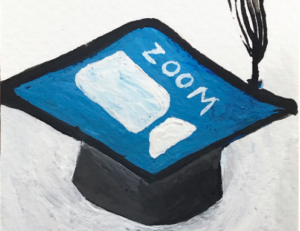Angela Wall walks out of San Quentin State Prison for what could be the last time. She has just finished teaching her final class of the semester at San Quentin’s Prison University Project (PUP for short), and she knows that she won’t be able to volunteer with the program during the coming term.
Wall has been volunteering with the program for two and a half years, and has fostered a number of deeply meaningful relationships with her students. However, because of the prison system’s unpredictability, Wall is uncertain whether or not she will see these people, some of whom check in with her on a weekly basis, ever again. She plans to return this summer, but as she drives out of the parking lot, Wall cannot help but wonder if she is letting her students down.
The Prison University Project at San Quentin State Prison is one of the only higher education programs for incarcerated people in America. The PUP offers college preparatory classes and an Associate of Arts degree program, both of which are taught completely by volunteers.
Founded in 1996, the program formerly partnered with Patten University in order to legally award degrees to students. After Patten closed in 2019, the PUP was granted candidacy for accreditation by the Accrediting Commission for Community and Junior Colleges. The program is now transitioning into an independent college under the name Mount Tamalpais College.
Daniel Barton is a Bay area criminal defense attorney and parent of two Lick alums. As a defense attorney, Barton is very familiar with the incarceration system. He describes San Quentin as “the jewel of the California Prison System,” because it has a wide range of programs which reward inmates for good behavior. In addition to the PUP, inmates can write for the San Quentin News or record for Ear Hustle, the prison’s podcast.
The existence of these programs is largely due to the prison’s proximity to the Bay Area’s progressive culture. There are many proximate institutions which believe in criminal justice reform and feel that giving inmates opportunities to learn and grow in prison is a step in the right direction. The San Quentin News, for example, partners with UC Berkeley’s Graduate School of Journalism, while the PUP relies upon local volunteer teachers.
Other more rural California prisons, such as those in Susanville and Tracy, are farther from well funded institutions, and do not offer a comparable range of programs.
Barton said that although there has been a swing towards new, progressive approaches to incarceration in California, he doesn’t foresee the kind of programming present at San Quentin being adopted at other prisons. He explained that such corrections are expensive, and increasing prison populations in California already require a lot of funding.
Wall, who is currently filling in for Lick-Wilmerding English teacher Linea Ogden, previously volunteered as an english teacher with PUP. She taught literature in the Associate of Arts Degree Program as well as preparatory writing courses in the College Prep Program. Wall also serves as a study hall tutor, where she works with students one on one.
In addition to these more formal roles, Wall often finds herself engaging with particularly enthusiastic students. “It’s like teaching anywhere,” she said. “You form connections [with] students who seem really committed and serious.”
Before she could begin teaching with the program, Wall had to take a day long preparatory course on the numerous prison rules and protocols. There are restrictions on what colors you can wear, how you can behave, and what items you can or cannot take in. Bound notebooks, for example, are permitted, while spiral notepads are not, and all possessions must be carried in a clear plastic container.
Wall was no stranger to teaching in a prison environment, as she had previously taught at a prison in Southern Illinois. Nevertheless, she described how before entering San Quentin for the first time, she was slightly intimidated by what she called the mythology of prison.
“We all have these ideas about what it is like to go into a prison,” she said. “We’ve seen Oz, we’ve seen Orange is the New Black, there are these media depictions, this trepidation around inmates.”
However, Wall recalls that within the first hour of being in San Quentin “All that went away and I kind of dropped into being a teacher with students.”
Teaching in a prison does present its own challenges, foremost among these being that inmates are not allowed internet access. All written assignments, including essays and drafts, must be handwritten. The PUP also has limited financial resources. Classroom materials are donated, and when it comes to books, the program is especially restricted. Once, when Wall proposed a new course, the program staff were super enthusiastic about the idea, but were unable to purchase sufficient books.
According to Wall, the prison bureaucracy can also be quite frustrating. Anything she hopes to teach must first get approval from a sensory board, which determines whether the material is overly violent or sexually explicit.
Because balancing all of these unique factors can be overwhelming, most classes are co-taught by two volunteers. Classes meet twice a week, once with each teacher, and tasks such as grading papers are also split in half.
Students in the PUP have varying educational backgrounds, but most have not had access to a stable education. “Students who come from any background with trauma tend to have had a much more disrupted relationship with education,” Wall said. Factors like fear of safety, hunger, constantly moving, or having a parent in prison, make it extremely difficult to succeed in school.
Barton said that education not only motivates people to dream big, it also vests them in the progress of their community. A lack of education, therefore, tends to alienate people from their communities and reduce their personal hopes and dreams. These consequences feed into a culture of marginalization which is often exacerbated by factors such as racism and poverty.

Wall said that she frequently meets bright young men “who love school and who are super bright, yet this is their first opportunity to, in a relatively safe environment, actually go to classes for nine months at a time with no interruption. The fact that the only place that happens for them is when they are in prison — that’s terrible.”
Prison is also the first place where many inmates have access to trauma and addiction programs, the type of programs which actually address the problems at the core of what they are facing. “It’s shocking that we’re not willing to do this in the outside world but we will pay for it in prison,” Wall said.
Wall described how before entering the PUP, many of her students struggled to reckon with their past mistakes. But as they go through PUP psychology classes, Wall has witnessed students realize, “Oh, now I see why I behaved like I behaved, now I understand why I did that.”
“I’ve been in a classroom space with people who, in any other circumstances, would have had very different lives,” Wall said.
One of Wall’s central goals as a PUP teacher is to give students the tools they need to “negotiate their way through the system.” She believes that educating incarcerated people is incredibly important, because skills like reading, writing and critical thinking will allow them to challenge the system and make informed decisions.
“You are of a population where everyone assumes they speak for you,” Wall tells her students. “The only way you gain a voice that will be heard in this system is by speaking the language of the people who are speaking at you, and by being able to think in the way they think.”
When discussing language in class, the idea of code switching often comes up. Many of Wall’s students have grown up using different colloquialisms to communicate, so Wall encourages her students to think about learning standard English as a form of bilingualism. She tells her students that while English is the prioritized way of thinking and speaking, other ways of thinking and speaking are just as valid.
Wall also believes that the skills she teaches in English class, such as listening, writing, and critical thinking, are important for life outside of prison.
Reintegration into society after being released from prison can be incredibly difficult for a number of reasons. In the Parole System, one is paroled back into the community where they commited the crime. This means that prisoners who have spent years fostering connections to local volunteer programs, local support groups, and local mentors, are often paroled into an entirely different part of the country.
Parolees find themselves in a completely unfamiliar environment with very little support, and they are suddenly expected to make a living and sustain themselves. The stress of this process makes parolees very vulnerable to relapse into addiction or crime.
Wall has observed how once you break the law, you are tagged as ‘criminal’ for the rest of your life. She believes that this is a big reason why society is reluctant to support incarcerated people as well as parolees.
“I have students who are 19, headstrong, willful and stupid, and students who are 65, who came in when they were 19, and who are not the same person any more,” Wall said. “We insist that people who break the law are one of the few groups that get to be only one age their whole life.”








nice work milo, quite interesting